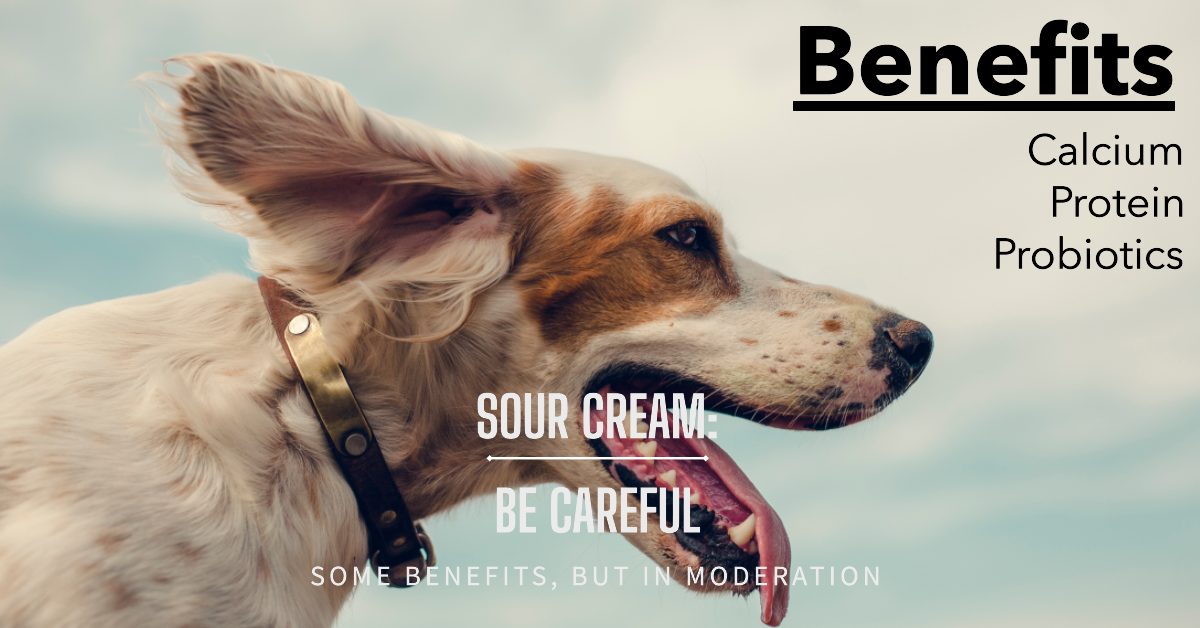
Sour cream is a popular ingredient used in various dishes and dips, but can dogs eat sour cream too? As pet owners, we always want to give our furry friends the best and safest treats. In this article, we will discuss if sour cream is safe for dogs, the pros and cons of feeding it to them, and some healthier alternatives. Make sure to check out our other articles on what dogs can and can’t eat, our dog food ingredients guide, and our guide to choosing the best dog food.
The short answer is yes, dogs can eat sour cream in small amounts. However, it is essential to consider the potential health issues that may arise from feeding your dog sour cream. Sour cream is a dairy product, and many dogs are lactose intolerant, which means they have difficulty digesting lactose, a sugar found in milk and dairy products. Consuming sour cream can lead to stomach upset, diarrhea, and vomiting in lactose intolerant dogs.

Sour cream contains essential nutrients such as calcium, protein, and probiotics. These nutrients can provide some health benefits to your dog:
Despite the nutrients mentioned above, there are several downsides to feeding your dog sour cream:
If you want to treat your dog with a dairy product, consider healthier alternatives to sour cream:
If you decide to give your dog sour cream, follow these precautions and tips to ensure their safety:
Consult your veterinarian:
If you are unsure about feeding sour cream to your dog or if your dog has a history of digestive issues, it is best to consult your veterinarian for personalized advice.
Many dog owners have shared their experiences with feeding sour cream to their pets. Some have found that their dogs can tolerate small amounts of sour cream without any issues, while others have noticed digestive problems in their dogs after consuming sour cream. It is essential to remember that each dog is different, and what works for one dog may not work for another.
For example, Lucy, a Labrador Retriever, enjoys a small dollop of sour cream occasionally without any issues. However, her owner ensures that it is given in moderation to prevent weight gain and other health problems. In contrast, Max, a Poodle, experienced stomach upset and diarrhea after consuming sour cream, leading his owner to stop feeding it to him.
While dogs can eat sour cream in small amounts, it is essential to be cautious and consider the potential risks associated with feeding this dairy product to your furry friend. Monitor your dog’s reaction to sour cream, and always consult your veterinarian if you have any concerns. Remember that moderation is key, and consider healthier alternatives like plain Greek yogurt or cottage cheese for a dairy treat that may be easier on your dog’s stomach.
No, dogs should not eat sour cream in large quantities due to its high fat content, which can lead to health issues such as obesity, pancreatitis, and digestive problems.
It’s best to avoid giving sour cream to puppies, as their digestive systems are more sensitive than adult dogs. Stick to a balanced puppy-specific diet to ensure proper growth and development.
Sour cream contains some calcium and protein, but these nutrients can be found in other, healthier foods for your dog. In general, sour cream does not provide significant health benefits for dogs.
Plain Greek yogurt and cottage cheese are healthier dairy alternatives for dogs. They are lower in fat and contain beneficial probiotics, which can support your dog’s digestive health.
If your dog accidentally eats a large amount of sour cream, monitor them for any signs of stomach upset, such as vomiting, diarrhea, or lethargy. If you notice any adverse reactions, contact your veterinarian for advice and potential treatment.